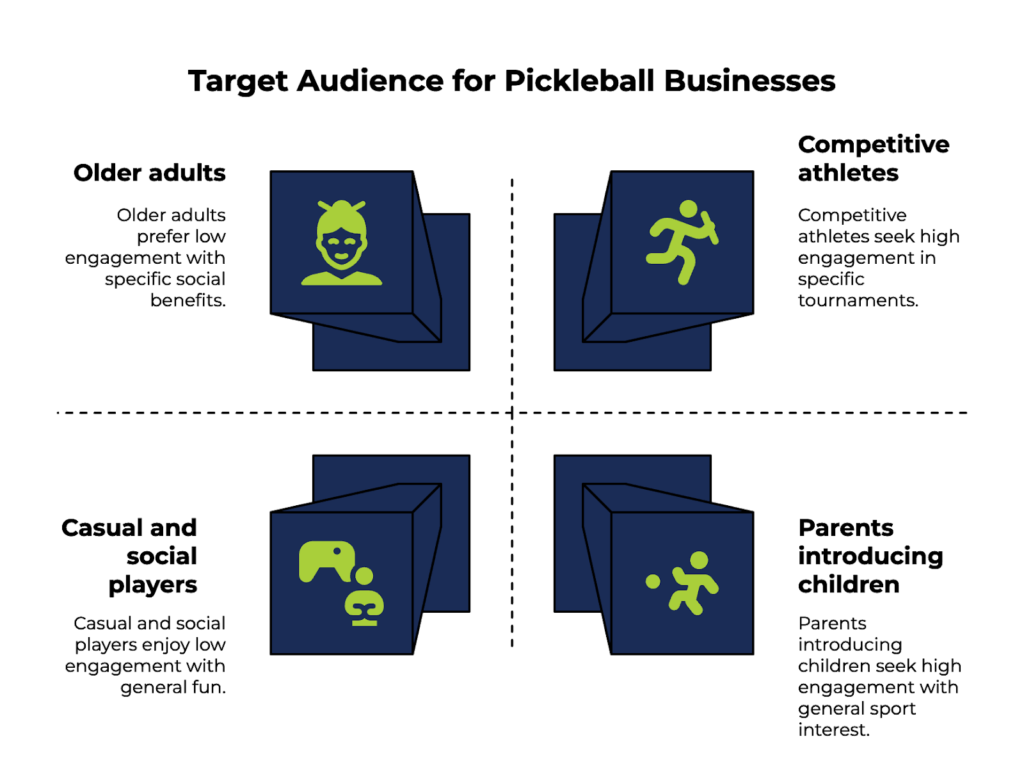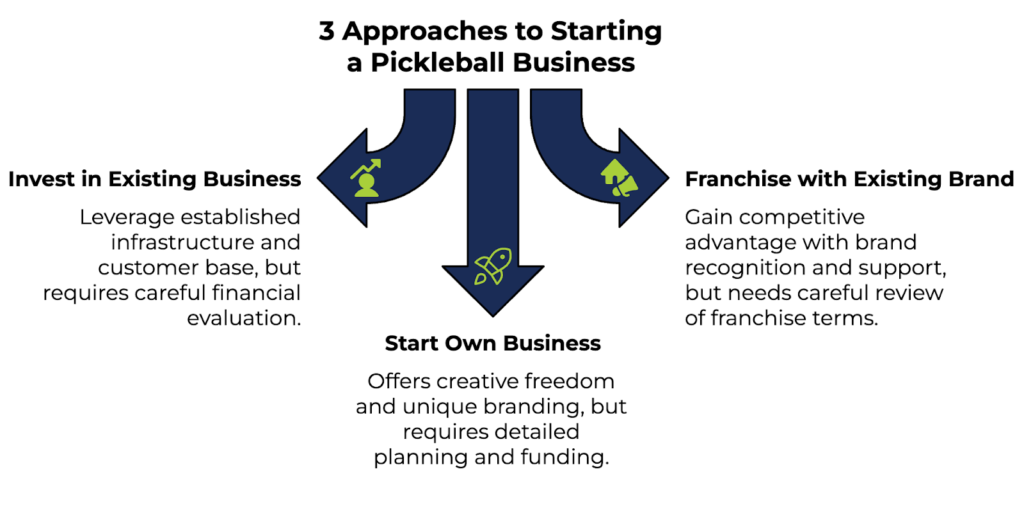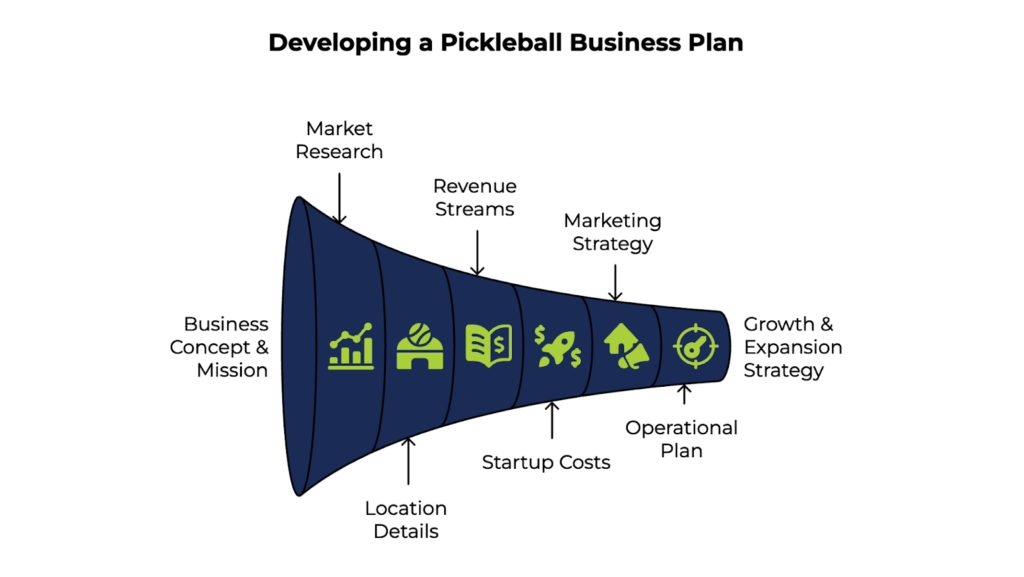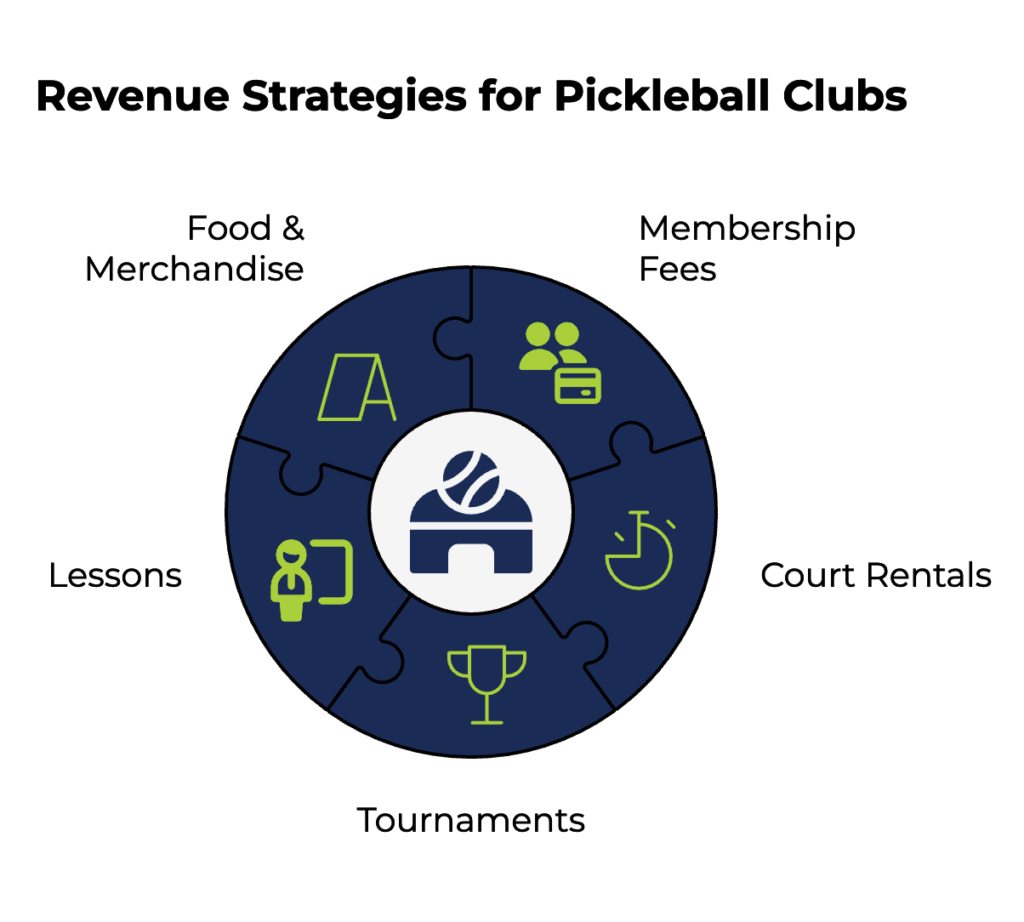What To Consider When Creating A Business Plan
Starting a pickleball business in 2025 presents exciting opportunities in the rapidly growing world of sports entrepreneurship. Pickleball’s surge in popularity has led to a booming demand for quality facilities, equipment, and services, in turn creating many opportunities for aspiring entrepreneurs.
Before diving headfirst into the world of pickleball entrepreneurship, it’s essential to establish a well-crafted pickleball business plan. In this guide, we’ll explore the key considerations, financial projections, and necessary insights involved in crafting a successful pickleball business plan in 2025. If you’re dreaming of launching a pickleball business, this comprehensive manual is aimed at teaching you how to capitalize on emerging trends in the pickleball industry.
Types of Pickleball Businesses You Can Start
Pickleball’s ever-increasing popularity has created a plethora of business opportunities within the sports entrepreneurship industry. Whether you aim to create pickleball courts or sell equipment, there are many business decisions to be made. No matter your overall goals within the industry, understanding the unique benefits of different pickleball businesses can guide you in determining the best path for your pickleball investment endeavors in this dynamic industry.
Indoor Court Clubs
Indoor pickleball courts offer year-round play in climate-controlled environments, benefitting players in areas with unpredictable weather or limited outdoor space. These facilities typically feature several indoor courts, amenities such as locker rooms and lounges, and a range of membership options to cater to the clientele’s preferences.
Outdoor Court Clubs
When it comes to traditional pickleball spaces, outdoor court clubs provide a classic experience, often erecting courts in parks, recreational centers, or dedicated pickleball facilities. Outdoor pickleball clubs offer the advantages of sunlight and fresh air, making them popular choices for players who enjoy a natural environment while playing America’s fastest growing sport.
Pickleball Equipment & Gear
Pickleball equipment and merchandise stores offer a wide variety of paddles, balls, and apparel to meet the diverse needs of pickleball players. In addition to high-quality equipment from leading brands, retail locations typically offer personalized recommendations from knowledgeable associates to enhance the playing experience. Whether a brick-and-mortar store or an online shop, pickleball equipment businesses play a crucial role in manufacturing supplies and fueling the growth of the pickleball space.
Who Is The Target Audience for Pickleball Businesses?

Pickleball attracts a diverse group of players, so it’s important to define your target audience when launching a pickleball business. Whether you’re opening a club, selling equipment, or offering lessons, understanding your customer base will help shape your business strategy.
Key demographics for pickleball businesses include:
- Older adults looking for a low-impact, social sport
- Competitive athletes seeking tournament play and skill development
- Casual and social players who enjoy group games and community engagement
- Parents introducing children to a fun and accessible sport
- Fitness enthusiasts looking for an alternative cardio workout
- Corporate groups or businesses interested in team-building activities and wellness programs
By catering to these audiences, you can adjust your services, pricing, and marketing efforts to maximize engagement and profitability in the growing pickleball industry.
3 Different Approaches To Starting A Pickleball Business

When deciding how to start a pickleball business, there are various approaches to consider. Whether you choose to invest in an existing business, franchise a pre-established brand, or start from scratch, you have flexibility in your entrepreneurial approach. By understanding the perks and drawbacks of each option, you can make informed decisions that align with your long-term goals in the pickleball industry.
1. Invest In An Existing Business
Investing in an existing pickleball business gives entrepreneurs the opportunity to capitalize on established infrastructure, customer base, and brand reputation. While this approach helps to mitigate the risk associated with starting from scratch and provides a smoother entry into the pickleball market, it’s essential to make financial projections prior to investing. Financial health, market position, market research, and growth potential, among many other factors, should all be evaluated before agreeing to support a pickleball business.
2. Franchise With An Existing Brand
Franchising with a reputable pickleball brand may grant you a significant advantage in the sports market. With a recognizable brand name, proven business model, dedicated marketing strategy, and ongoing support from the franchisor, you’ll have many of the tools needed to gain a competitive advantage in the pickleball industry. Conflicts may arise if the terms of your franchise agreement are not carefully reviewed, so it’s crucial to evaluate your franchisor’s policies on fees, territory rights, and performance expectations before entering a business partnership.
3. Start Your Own Business
If you dream of building a unique brand and generating a tailored consumer experience, starting your own pickleball business may be the right choice for you. This approach grants you creative freedom, flexibility, and the chance to differentiate your business in the competitive pickleball market. With agency comes great responsibility; however, so it’s important to map out a detailed business plan, build a comprehensive marketing strategy, and secure appropriate funding to ensure the growth and sustainability of your business.
Creating Your Pickleball Business Plan: What You Need to Include

1. Conduct Market Research & Define Your Business Idea
Start by analyzing the local market to understand the demand for pickleball. Look at demographic data to identify potential customers and study local competitors to gauge the market’s saturation. This initial marketing plan will help you refine your business concept, ensuring it meets the unique needs and preferences of your target audience.
2. Decide How You Would Like To Drive Revenue
Consider diverse revenue streams to build a strong pickleball business model. Membership fees can provide steady income, while offering court rentals and coaching services can attract casual players and serious athletes alike. Additionally, hosting tournaments and selling branded merchandise can boost your revenue.
3. Set Clear Goals & Objectives For Your Business
Define clear, SMART goals to guide your business strategy. These should include specific targets for membership growth, revenue milestones, and expansion plans. Setting these objectives early will help you monitor progress and make informed decisions as your pickleball business develops.
4. Develop A Marketing Strategy
Develop a marketing strategy that leverages both digital and traditional marketing channels. Utilize social media to build a community around your brand, and consider partnerships with local sports clubs and schools to increase visibility. Promotions and special events can also help attract new customers and turn them into members of your pickleball club.
5. Write Your Business Plan
Compile all the gathered information into a detailed business plan. This document should outline your business concept and market analysis. It should also include a clear organizational structure, product offerings, pricing, and a detailed marketing and sales strategy. Your financial projections should be based on realistic assumptions derived from your market research.
Revenue Streams & Pricing Models for Pickleball Clubs

Pickleball clubs can thrive financially by tapping into multiple revenue streams that go beyond just court time. A well-rounded business model should encompass offerings that appeal to both casual and competitive players, while fostering community and brand loyalty.
- Membership Fees: Tiered packages offering perks like unlimited play, discounts, and priority booking
- Court Rentals: Hourly rentals, group packages, or event bookings to monetize open court time
- Tournaments: Revenue from entry fees, sponsorships, concessions, and merchandise while attracting wider audiences
- Lessons & Clinics: Paid group or private pickleball lessons led by certified instructors
- Food & Merchandise Sales: Snacks, drinks, and branded gear enhance experience and boost profits
Together, these income sources can help build a sustainable and scalable club while delivering value to members and guests. Consider local partnerships to strengthen your offerings and differentiate your club.
Common Types of Pickleball Club Programs to Offer
Offering the right mix of programs can keep your members engaged, attract new players, and create steady revenue for your pickleball business. Here are some popular program ideas to consider:
- Beginner clinics: Introductory lessons that help new players learn the rules, scoring, and basic techniques in a low-pressure environment.
- Skill-level leagues: Weekly match play organized by player ability, helping members improve and meet others at their level.
- Open play sessions: Designated times where members can drop in, rotate partners, and play casually with a mix of players.
- Youth programs: Kid-friendly instruction and games that help younger players develop coordination, confidence, and a love for pickleball.
- Cardio pickleball: High-energy sessions that combine fitness drills with fast-paced play for those looking to break a sweat.
- Social events: Themed nights, tournaments, or friendly competitions to bring the community together.
- Private & semi-private lessons: Personalized coaching for players looking to fine-tune their game.
- Corporate team-building packages: Group sessions for businesses that want to promote wellness, collaboration, and fun outside the office.
- Adaptive pickleball: Inclusive programs designed for players with physical or cognitive challenges, making the sport accessible to everyone.
Pickleball Club Operating Costs & Considerations
Operating a successful pickleball club requires careful planning and organization to ensure long-term success and sustainability. From staffing and scheduling to marketing and compliance, there are many key factors and costs to running a pickleball court to consider when managing day-to-day functions.
- Staffing Costs: Plan for salaries, benefits, and training for front desk, coaching, maintenance, and admin teams.
- Scheduling Technology: Use online booking systems to streamline reservations, lessons, and court usage.
- Marketing Strategies: Promote the club through social media, local outreach, email campaigns, and community events.
- Rules & Regulations: Enforce official pickleball standards, post clear signage, and maintain safe conditions for all players.
Together, these elements form the operational backbone of a thriving pickleball club, ensuring a high-quality experience and long-term sustainability.
What You Might Want to Know Before Starting Your Own Pickleball Business
Can pickleball courts be profitable?
Pickleball courts have the potential to be profitable for clubs that effectively manage their operations, attract a steady stream of players, and offer additional services such as lessons, tournaments, and merchandise sales. By diversifying revenue streams and controlling expenses, pickleball clubs can generate a healthy profit margin while providing valuable recreational opportunities for players.
Why is pickleball gaining popularity so quickly?
Pickleball’s rapid rise in popularity may be attributed to its general accessibility, simplicity, and appeal to players of all ages and skill levels. For beginners and older adults, pickleball’s straightforward rules and low-impact nature make it an attractive, low-risk activity, while its social nature and fast-paced gameplay may appeal to more serious athletes. Increased media coverage and the rapid development of pickleball facilities have also contributed to worldwide awareness.
Is it better to start a new pickleball club or invest in an existing one?
The decision to create your own pickleball club or invest in an existing one depends on your personal goals as a sports entrepreneur. Market demand, competition, and available resources may influence your overall decision. While the freedom of opening a new club may be attractive to those with substantial funding, investing in an existing pickleball facility may be a more frugal option for business beginners.
What are the biggest challenges facing new pickleball businesses?
When starting a new pickleball business, you may be faced with competition from other facilities, financial hardships, and strict zoning requirements. Upon opening your club, your marketing plan, staffing, and scheduling are vital to ensure a steady customer base. Overcoming these initial challenges requires a detailed business strategy as well as a commitment to curating exceptional experiences for pickleball enthusiasts.
Start Building Your Pickleball Business Today with PickleRage
If the opportunity to feed into the current pickleball frenzy sounds like a rush, you may be considering an investment in a pickleball club. When you’re ready to capitalize on this dynamic and rapidly-growing sports venture, contact PickleRage today to start plotting your emergence into the world of pickleball.
Note: PickleRage LLC and its affiliates do not provide investment, financial, tax, legal or accounting advice. The contents of this blog have been prepared for informational purposes only, reflect solely our belief, and are not intended to provide, and should not be relied on for, investment, financial, tax, legal or accounting advice. You should consult your own investment, financial, tax, legal and accounting advisors before engaging in any type of pickleball related investment.
This information is not intended as an offer to sell a franchise. It is for information purposes only. We will not offer you a franchise until we have complied with disclosure and registration requirements in your jurisdiction. Contact PickleRage Franchise LLC, to request a copy of our FDD. RESIDENTS OF NEW YORK: This advertisement is not an offering. An offering can only be made by a prospectus filed first with the Department of Law of the State of New York. Such filing does not constitute approval by the New York Department of Law.
